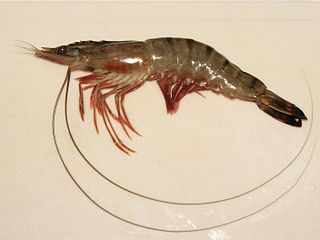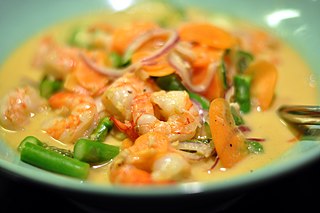| Got the Thirst | ||||
|---|---|---|---|---|
 | ||||
| Studio album by | ||||
| Released | 2003 | |||
| Genre | wildstyle | |||
| Label | Golf Records | |||
| King Prawn chronology | ||||
| ||||
Got the Thirst is the fourth album by London 'wildstyle' band King Prawn. It was released in 2003.
| Got the Thirst | ||||
|---|---|---|---|---|
 | ||||
| Studio album by | ||||
| Released | 2003 | |||
| Genre | wildstyle | |||
| Label | Golf Records | |||
| King Prawn chronology | ||||
| ||||
Got the Thirst is the fourth album by London 'wildstyle' band King Prawn. It was released in 2003.

Whiteleg shrimp, also known as Pacific white shrimp or King prawn, is a species of prawn of the eastern Pacific Ocean commonly caught or farmed for food.

Hokkien mee, literally "Fujian noodles", is a series of related Southeast Asian dishes that have their origins in the cuisine of China's Fujian (Hokkien) province.

The Parktown prawn, African king cricket or tusked king cricket is a species of king cricket endemic to Southern Africa. It is unrelated to prawns, Libanasidus being insects in the order Orthoptera – crickets, locusts and similar insects. The king crickets are not true crickets either: they belong to the family Anostostomatidae, whereas true crickets are in the Gryllidae. The insect gets its English name from the suburb of Parktown in Johannesburg, South Africa, where they are common. It is found throughout Namibia, and in the southern savanna and semi-arid regions of Angola. The Parktown prawn is related to the New Zealand tree wētā, which is also in the family Anostostomatidae.

A freshwater prawn farm is an aquaculture business designed to raise and produce freshwater prawns or shrimp for human consumption. Freshwater prawn farming shares many characteristics with, and many of the same problems as, marine shrimp farming. Unique problems are introduced by the developmental life cycle of the main species.

Penaeus is a genus of prawns, including the giant tiger prawn, the most important species of farmed crustacean worldwide.
Melicertus is a genus of "king" prawns, comprising eight species which were previously classified as members of the genus Penaeus:

"Shrimp on the barbie" is a phrase that originated in a series of television advertisements by the Australian Tourism Commission broadcast in the US and UK starring Paul Hogan from 1984 through to 1990. The full quote spoken by Hogan is "I'll slip an extra shrimp on the barbie for you", and the actual slogan of the ad was "Come and say G'day". It has since been used, along with some variations, to make reference to Australia in popular culture, however the phrase is rarely actually used in Australia. Very few use the word 'shrimp' in Australia and the phrase is often perceived as American.

Prawn cocktail, also known as shrimp cocktail, is a seafood dish consisting of shelled, cooked prawns in a Marie Rose sauce or cocktail sauce, served in a glass. It was the most popular hors d'œuvre in Great Britain, as well as in the United States, from the 1960s to the late 1980s. According to the English food writer Nigel Slater, the prawn cocktail "has spent most of see-sawing from the height of fashion to the laughably passé" and is now often served with a degree of irony.

William Paul Barretta is an American puppeteer, actor, producer, writer and director, who is best known for providing the puppetry and voice of characters such as Pepe the King Prawn, Johnny Fiama, Big Mean Carl, and Bobo the Bear. He originated the role of Louie, Elmo's dad, on Sesame Street. Barretta also inherited the roles of Rowlf the Dog, The Swedish Chef, Mahna Mahna, and Dr. Teeth after the death of Muppet creator Jim Henson.

King Prawn are an English ska punk band founded in 1993. The band split in 2003, later reforming for a second run in 2012.
King prawn may refer to:

Spy Muppets: License to Croak is an action video game, part of The Muppets franchise and released on November 18, 2003 made for Microsoft Windows and Game Boy Advance by Vicarious Visions and published by TDK Mediactive. It is a spoof of the James Bond films, the title being a reference to Licence to Kill. The player controls Kermit the Frog through several stages in order to stop the bad guys.

Shrimp and prawn are types of seafood that are consumed worldwide. Although shrimp and prawns belong to different suborders of Decapoda, they are very similar in appearance and the terms are often used interchangeably in commercial farming and wild fisheries. A distinction is drawn in recent aquaculture literature, which increasingly uses the term "prawn" only for the freshwater forms of palaemonids and "shrimp" for the marine penaeids.

A shrimp is a crustacean with an elongated body and a primarily swimming mode of locomotion – typically belonging to the Caridea or Dendrobranchiata of the decapod order, although some crustaceans outside of this order are also referred to as "shrimp".

Prawn is a common name for small aquatic crustaceans with an exoskeleton and ten legs, some of which are edible.

Hoo Hey How (Yu Xia Xie) (Chinese: 魚蝦蟹; lit. 'Fish-Prawn-Crab', Pinyin: Yu Xia Xie) is a Chinese dice game played with three identical six-sided dice. It is related to Bầu cua cá cọp in Vietnam, Klah Klok/kla klouk in Cambodia, and similar to Crown and Anchor in the West Indies and the American game chuck-a-luck.

Fairy King Prawn was an Australian-bred, Hong Kong-trained Thoroughbred racehorse. After being sold and exported to Hong Kong as a yearling he became one of the most successful and popular horses in his adopted territory. Equally adept as a sprinter or as a miler he won twelve of his twenty-six starts including the Chairman's Sprint Prize (twice) the Hong Kong Sprint, Hong Kong Stewards' Cup and Bauhinia Sprint Trophy. In 2000 he became the first Hong Kong horse to win a Grade One race abroad when he won the Yasuda Kinen in Japan. He won numerous awards including the title of Hong Kong Horse of the Year on two occasions. He was retired from racing in 2002 after undergoing surgery for serious leg injuries. After working for several years at a Hong Kong riding school he was sent into full retirement in New Zealand in 2011.

Chingri malai curry or malai chingri, also known as prawn malai curry, is a Bengali curry made from tiger (bagda) and king prawns (chingri) and coconut milk and flavoured with spices. The dish is popular throughout Bengal and is served during weddings and celebrations, or for guests, and was also very popular among the British in Calcutta. It is a really popular dish from Cox's Bazar.

Prawn crackers are a deep-fried snack made from starch and prawn. They are a common snack food in Southeast Asian cuisine, but they are most closely associated with Indonesia. They have also been adapted into East Asian cuisines, where the similar Japanese kappa ebisen (かっぱえびせん) and Korean saeukkang are popular snacks.
Curacha Alavar, sometimes referred to as curacha con salsa Alavar in Chavacano a Spanish-based creole language, is a Filipino dish made from spanner crabs (curacha), garlic, ginger, salt, and Alavar sauce. The key ingredient is the Alavar sauce, a secret blend of coconut milk, taba ng talangka, and various spices.